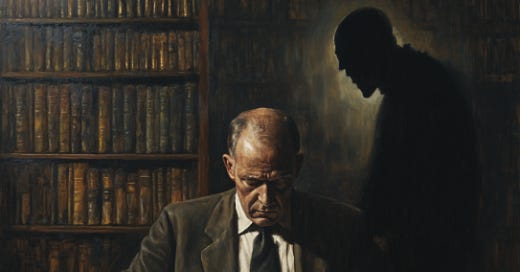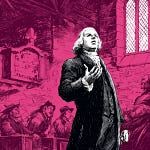Question 46: What was the Holy Spirit in God’s redemptive revelation in the days of the Apostles?
Answer: The Holy Spirit, in the days of the Apostles and through their ministry, was the divine author and revealer of Christ, who by acts, words, theophanies, and symbols, testified to the incarnate Word, empowered the Apostles to speak and write God’s truth, confirmed the gospel with signs and wonders, and preserved for the Church the enduring witness of scripture.
C.S.Lewis, in the first letter of his book “The Screwtape Letters”, wonderfully captures one of our typical problems in the spiritual life. The Screwtape Letters, for those who haven’t read it, recounts a fictional exchange of letters between a senior demon with a junior demon learning the dark arts of temptation. Take a look:
“I once had a patient, a sound atheist, who used to read in the British Museum. One day, as he sat reading, I saw a train of thought in his mind beginning to go the wrong way. The Enemy, of course, was at his elbow in a moment. Before I knew where I was I saw my twenty years' work beginning to totter. If I had lost my head and begun to attempt a defence by argument, I should have been undone. But I was not such a fool. I struck instantly at the part of the man which I had best under my control, and suggested that it was just about time he had some lunch. The Enemy presumably made the counter-suggestion (you know how one can never quite overhear what He says to them?) that this was more important than lunch. At least I think that must have been His line for when I said ‘Quite. In fact much too important to tackle at the end of the morning,’ the patient brightened up considerably; and by the time I had added ‘Much better come back after lunch and go into it with a fresh mind,’ he was already half way to the door” (Lewis, Screwtape Letters, p.2-3).
Screwtape goes on to describe how he steered his “patient” out of the museum and into the street, where the daily bustle effectively buried any lingering spiritual insight. A “healthy dose of ‘real life’… was enough to show him that all ‘that sort of thing’ just couldn’t be true”. Screwtape used the “real world” and mundane concerns (like the noise of buses and the smell of fried food) to quash deeper reflection in this man. Screwtape boasts that “he is now safe in Our Father’s house”—a chilling phrase referring, of course, to Hell.
I wonder if you have ever experienced this kind of thing? Have you ever experienced a sense of unreality on spiritual matters, in comparison to a much more concrete sense that the things of this life are the “real” thing? You walk down your street, breathe some cold morning air, a car drives past and you hear the sound of the rubber against the road, you feel the hard concrete thudding under your feet – and there is an unmistakable certainty. This is real, and the physical effects of the experience have a solid impact on your mind. Spiritual experiences, on the other hand, can often seem just beyond the realm of reality, an intangible mist that is easily doubted. Is there actually anything real going on when I read chapter one in John’s first epistle? Or is this just me labouring through some words on a quiet still morning? I don’t feel changed. Would it be just the same if I read my favourite novel instead? I don’t feel different. The words I’m reading are not having any effect on me. So we think, at any rate.
The puritan, Ralph Venning, potently captures the real spiritual diagnosis of this problem: “Man has become so sottish and brutish that he lives by sense. Now sense will never look to God who is invisible – that is for faith – but to the creatures, which are visible, and the objects of sense” (Venning, Sinfulness of Sin, p.44). In other words, what Venning laments here is the way that sin deadens a man to all except his physical experiences and environment. Sin makes materialists of us all. “Let us eat, drink, and be merry, for tomorrow we die.” Sin makes a man so spiritually blind, insensitive, and dead, that he lives only by what he can perceive with his physical senses, and is directed accordingly. The lust of his eyes, he is directed by what he can see and smell and hear. The desires of his body, his drives and appetites – these are the things by which we are naturally dominated.
This spiritual deadness continues to haunt us even in our lives as believers. “For we know that the law is spiritual, but I am of the flesh, sold under sin. For I do not understand my own actions. For I do not do what I want, but I do the very thing I hate.” (Rom 7:14-15). We see unbelievers across the span of scripture’s recorded history facing this struggle. Yet the Holy Spirit has done a wondrous work for us in providing just what we need to revive and strengthen our feeble souls. He has testified to us, giving us the very word of life, conveyed to us through the Apostles: “That which was from the beginning, which we have heard, which we have seen with our eyes, which we looked upon and have touched with our hands, concerning the word of life— the life was made manifest, and we have seen it, and testify to it and proclaim to you the eternal life” (1 Jn 1:1-2).
As we consider the work of the Holy Spirit in authoring and preserving the New Testament for us, we thus find and are reminded of God’s potent counter-strategy for us as we wage war against the spiritual deadness and blindness of sin. As we consider this question of the Holy Spirit’s work of revelation in penning and preserving the New Testament for us, we’re getting closer and closer to the question of the way that the Spirit reveals truth to us today – in our own lives. As we’ve seen repeatedly in our studies, Christ is the grand centre point of divine revelation. His incarnation was, is, and remains the glorious heart of the Spirit’s work of revelation. Before we do consider how he makes or applies that revelation in a person’s life today, however, there is a bridge that we need to cross. So, let’s step out onto this bridge and see what it’s made of.
After Christ ascended into heaven, the Apostles were appointed to bear witness to him Christ in an authoritative and unique way (Eph 2:20; 3:5).1 As Morris said: “…it was the apostles and not someone else who bore the definitive witness to what Jesus did for men” (Morris, Revelation, 30). The Book of Acts shows us clearly that the Holy Spirit ministered through the Apostles in a similar way to his ministry through the Old Testament prophets.
Now – let’s remember the four modes of divine revelation: i) act; ii) word; iii) theophany; and iv) symbol. As to acts of revelation, we find the “signs of the Apostles” (Acts 2:43; 2 Cor 2:12). As to word-revelation, the Spirit gave prophetic utterance to the Apostles in the days of the early church (Acts 4:8). The prophetic word ministry of the Apostles, like that of the Old Testament prophets, also extended to a written prophetic word. Peter attested to Paul’s letters as being on par with the Old Testament scriptures (2 Pt 3:16), and the Apostles knew also that what they spoke and penned was not their own words, but those of “Christ speaking” in them (1 Cor 14:37; 2 Cor 13:3). By the Spirit’s power Stephen’s eyes were opened to a theophonic vision of the Ascended Christ (Acts 7:55), so also the Spirit revealed himself in a theophany as tongues of fire appeared when he was poured out on the believers in the upper room (Acts 2). As to symbol, the Apostles faithfully ensured that the Lord’s Supper would be preserved by custom in the Church (1 Cor 11:23-34).
All these works of revelation by the Holy Spirit – both Old Testament and New – culminate in the written word of God, which is the enduring revelation given to us for the ages of Church history. As Walter Chantry points out, even the signs and miracles, being revelatory acts in themselves, were given that we may “Give more earnest heed to the things that we have heard” (Heb 2:1; Chantry, Signs of the Apostles, p.18). By the way, Chantry’s book is a very important work that ought to be read on questions of revelation, and especially of miracles. I commend it to you!
All of this forcefully reinforces a point that is given to us at many points throughout the scriptures: hold fast to the word of God. Meditate on it day and night (Ps 1). It is a lamp unto our feet, and a light unto our path (), and if we neglect to take it up, then we will have no light and quickly go wondering from the way in the darkness of the night. Are you reading your New Testament? Or are you neglecting, day by day, to pick it up? Persevere, and encourage your brothers and sisters in the same. Much is at stake, and much help us at hand. SDG.
1 Galatians 2:2 is one example of a revelation given to an apostle.













Share this post